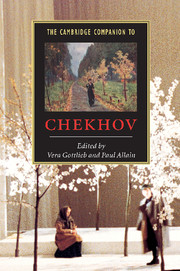Book contents
- Frontmatter
- Part 1 Chekhov in context
- Part 2 Chekhov in production
- 4 From Platonov to Piano
- 5 Chekhov's one-act plays and the full-length plays
- 6 Ivanov: the invention of a negative dramaturgy
- 7 The Seagull: an adaptation
- 8 Notes from a director: Uncle Vanya
- 9 Notes from a director: Three Sisters
- 10 The Cherry Orchard
- 11 Acting Chekhov: 'a friend to the actor'
- 12 The scenography of Chekhov
- 13 Chekhov on screen
- 14 Chekhov on the Russian stage
- 15 Directors' Chekhov
- Part 3 Chekhov the writer
- Appendix 1 Chekhov's works: primary sources from the Russian - Variations of English titles from the Russian
- Appendix 2 Selected stage productions
- Appendix 3 Selected screen versions
- Appendix 4 Illustrations
- Selected bibliography
- Index of Works by Checkov
- General Index
13 - Chekhov on screen
from Part 2 - Chekhov in production
Published online by Cambridge University Press: 28 May 2006
- Frontmatter
- Part 1 Chekhov in context
- Part 2 Chekhov in production
- 4 From Platonov to Piano
- 5 Chekhov's one-act plays and the full-length plays
- 6 Ivanov: the invention of a negative dramaturgy
- 7 The Seagull: an adaptation
- 8 Notes from a director: Uncle Vanya
- 9 Notes from a director: Three Sisters
- 10 The Cherry Orchard
- 11 Acting Chekhov: 'a friend to the actor'
- 12 The scenography of Chekhov
- 13 Chekhov on screen
- 14 Chekhov on the Russian stage
- 15 Directors' Chekhov
- Part 3 Chekhov the writer
- Appendix 1 Chekhov's works: primary sources from the Russian - Variations of English titles from the Russian
- Appendix 2 Selected stage productions
- Appendix 3 Selected screen versions
- Appendix 4 Illustrations
- Selected bibliography
- Index of Works by Checkov
- General Index
Summary
Although Anton Chekhov was only thirty-six when the cinema was invented, serious film-making did not begin in Russia until a couple of years after his death. So, unlike his contemporaries Maxim Gorky (six years his junior) and George Bernard Shaw (four years his senior), who both took a passionate interest in the possibilities of the new medium, he did not live to see his work reach the screen. His niece however, Olga Chekhova, a sculptress who emigrated to Germany, appeared in F. W. Murnau's Schloss Vogelod (1921) and Rene Clair's Un Chapeau de paille d'Italie (1927), and his nephew, Michael Chekhov, enjoyed considerable success in America as both teacher and actor, his most celebrated role being the psychotherapist to whom Ingrid Bergman takes Gregory Peck in Alfred Hitchcock's Spellbound (1945).
As early as 1911 there was a one-reel Russian comedy based on Chekhov's story 'Romance with Double Bass', directed by Kai Hansen. (The British comedian John Cleese directed and appeared in an amusing British version of this tale in 1974 with his then wife, Connie Booth.) In 1914 Boris Glagolin made movies of Illegal and The Daughter of Albion, and in 1917 Boris Sushkevich filmed The Flowers Are Late. Meanwhile, in 1913, Vladimir Mayakovsky evoked the playwright's name in the magazine Kine-Journal in an article called 'Theatre, Cinema, Futurism': 'The theatre moves towards its own destruction, and hands over its heritage to the cinema. And the cinema industry, branching away from the naive realism and artifice of Chekhov and Gorky, opens the door to the cinema of the future - linked to the art of the actor.
- Type
- Chapter
- Information
- The Cambridge Companion to Chekhov , pp. 149 - 161Publisher: Cambridge University PressPrint publication year: 2000

